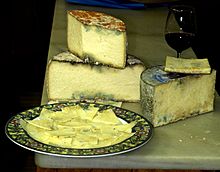Gamonéu cheese facts for kids
Quick facts for kids Gamonéu |
|
|---|---|
 |
|
| Other names | Camonéu |
| Country of origin | Spain |
| Region | Asturias |
| Source of milk | Cows, sheep, goats. |
| Texture | firm, crumbly |
Gamonéu cheese (pronounced Gah-moh-NAY-oo) is a special kind of cheese from a region in Spain called Asturias. It gets its name from the village of Gamonéu, where it was first made. This cheese is known for being a bit smoky and has a thin, natural rind that looks brownish with patches of red, green, and blue. Sometimes, a little bit of mold on the rind even grows into the cheese itself!
Like many cheeses from this area, Gamonéu is made by mixing milk from cows, goats, and sheep. It's usually sold in cylinder shapes, like a can, and can weigh from about half a kilogram (18 ounces) up to 7 kilograms (15 pounds). Gamonéu cheese has a special status called a "Protected Designation of Origin." This means it can only be made in certain places and in a specific way to keep its unique quality and tradition.
Two Kinds of Gamonéu Cheese
There are two main types of Gamonéu cheese, each with its own special qualities:
Gamonéu del Puertu
This type of Gamonéu cheese is made high up in the mountains, in what are called "high passes." Because of where it's made, Gamonéu del Puertu is usually harder and drier than the other type. It's also quite rare because it can only be made during the summer months when the weather is good enough to be in the uplands. This makes it a very sought-after cheese!
Gamonéu del Valle
In contrast, Gamonéu del Valle is made in the lower valleys. This cheese is known for being richer and creamier. Unlike its mountain cousin, Gamonéu del Valle can be made all year round, so it's more widely available. Both types are delicious, but they offer slightly different textures and flavors.
Images for kids
See also
 In Spanish: Queso de Gamonéu para niños
In Spanish: Queso de Gamonéu para niños
 | James Van Der Zee |
 | Alma Thomas |
 | Ellis Wilson |
 | Margaret Taylor-Burroughs |


